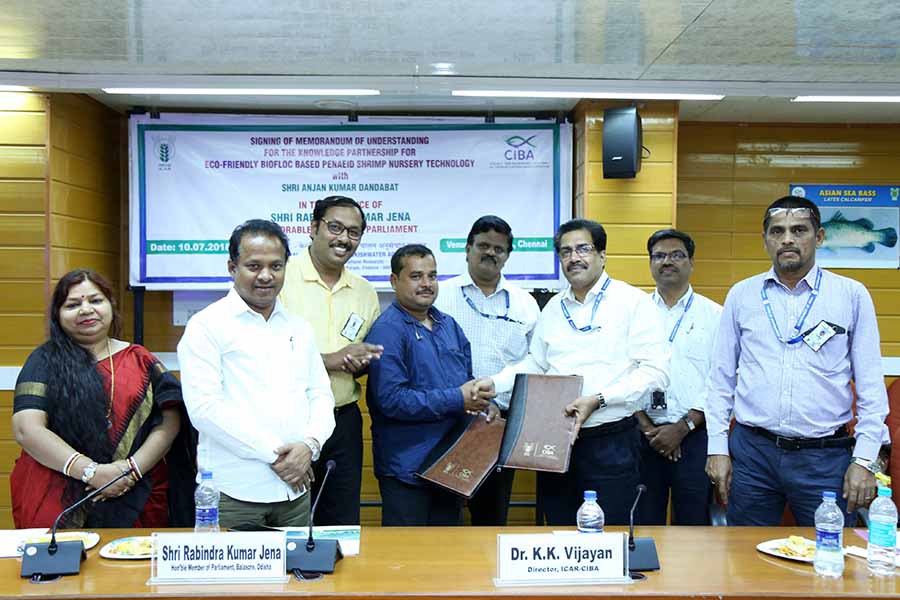ICAR-Central Institute of Brackishwater Aquaculture, Chennai has been conducting Frontline Demonstrations on Biofloc based Nursery rearing Technology for Pacific white shrimp Penaeus vannamei in different parts of the country with support from the Department of Biotechnology, Govt. of India. The genesis of this demonstration was initiated with the MOU signed by ICAR-CIBA with one progressive farmer (Dandapat Aquatics) on 10th July 2018 in presence of Hon’ble Member of Parliament Mr Rabindra Jena. CIBA is promoting eco-friendly farming technologies such as Organic, IMTA and Biofloc based farming technologies (BFT) in the country through demonstrations and trials, for the promotion of sustainable brackishwater aquaculture. Shrimp aquaculture is the economic face of Indian aquaculture and one of the fastest growing food producing sectors. Indian shrimp industry had phenomenal growth with the introduction of exotic species Penaeus vannamei, reaching 5.66 lakh tonnes of production in 2017-18 and accounting for 41 % of the quantity and 68 % in value (Rs. 30,880 crores) of total seafood exports (MPEDA, 2018).
As part of the demonstration and to disseminate the BFT based shrimp nursery technology in Odisha, a Farmer-Scientist Interaction Meet was organized at Sahada, Balasore, on 27th September 2018. Explaining the technology Dr Akshaya Panigrahi, Principal Scientist, ICAR-CIBA and Principal Investigator of the project stated that this innovative eco-based technology helps in sustainable production through the conversion of waste to microbial floc as natural food within the culture system, ensuring sustainable income. Nursery system has several advantages such as optimization of farmland, increase in survival, enhanced growth performance, the protective response of shrimp, uniformity of size and reduction in the farm grow-out period, and reduction of cannibalism. CIBA has developed BFT and demonstrated the technology in the field with SOP (Standard Operating Procedure). The farmer trainees and other stakeholders who came for exposure visit witnessed the system and pond stocking of the nursery-reared juveniles. This technology ensures good survival of 90 to 98 % and juveniles reaching a size of 300 to 600 mg when stocked at a density of 3000 to 8000 PLs/m3. Nursery rearing phase extends for 3-4 weeks and can reduce the culture period in the grow-out phase by 20-30 days. It improves productivity, natural food, FCR, economic gain; and reduced costs (15-20% lower cost of production). A farmer friendly publication on nursery rearing technology for penaeid shrimp with salient points about the technology was released on this occasion.
Many stakeholders and delegates along with 200 participating farmers gather to witness this program. Dr S. Felix, Vice Chancellor, Tamilnadu Jayalalitha Fisheries University was the Chief Guest and lauded the achievements of ICAR-CIBA, Chennai in promoting this innovative technology. Dr Haribandhu Panda, Vice Chancellor, Centurian University wanted this model to be adopted, other shrimp farmers. Mrs Subhasini Jena, Social activist, Balasore, stressed upon improving the infrastructure for carrying out this hi-tech nursery system proposed by ICAR-CIBA so that the coastal farmers of the district and state will be benefited. The Deputy Director of Fisheries, Balasore Zone Mr Ajay Bhoi encouraged the farmers to adopt this technology. Seafood Export Association President of Odisha, Dr Kamalesh Mishra spoke about the issues in shrimp export and Mr Anjan Dandapat, President, Sahada Fisheries Society, and the progressive farmer who adopted the BFT made a presentation on benefits of BFT based nursery system. The program ended with vote of thanks delivered by Mr Biranchi Panda, Secretary, Shrimp Farmer Association, Odisha.
